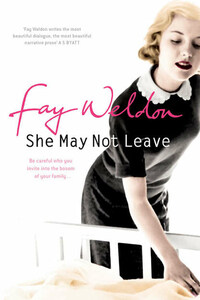‘I’m old enough to speak the truth,’ said my grandmother, her voice bouncing over the Atlantic waves, ridiculously girlish. ‘Nothing stops me now, Sophia, not prudence, or kindness, or fear of the consequences. I am eighty-five. What I think I say. It is my privilege. If people don’t like what they hear they can always dismiss it as dementia.’
My grandmother Felicity had seldom refrained from speaking the truth out of compassion for others, but I was too tired and guilty to argue, let alone murmur that actually she was only eighty-three, not eighty-five. Felicity spoke from her white clapboard house on a hillside outside Norwich, Connecticut, with its under-floor music system and giant well-stocked fridge, full of uneatable doughy products in bright ugly bags, Lite this and Lite that, and I listened to her reproaches in a cramped brick apartment in London’s Soho. Her voice echoed through an expensive, languid, graceful, lonely, spacious, carpetless house: she kept the doors unlocked and the windows undraped, squares of dark looking out into even blacker night, where for all anyone knew axe murderers lurked. My voice in reply lacked echo: here in central London the rooms were small and cluttered and the windows were barred, and thick drapes kept out the worst of the late-night surge of noise as the gay pubs below emptied out and the gay clubs began to fill. I felt safer here than I ever did when visiting Felicity on her grassy hillside. A prostitute worked on the storey below mine, sopping up any sexual fury which might feel inclined to stray up the stairs, and a graphic designer worked above me, all fastidious control and expertise, which I liked to think seeped downwards to me.
Mine was a fashionable, expensive and desirable address for London. I could walk to work, which I valued, though it meant pushing my way through crowds both celebratory and perverse: the tight butts of the sexually motivated and the spreading butts of gawking tourists an equal nonsense. Was there no way of averaging them out, turning them all into everyday non-loitering citizens? But then you might as well be living in a suburb, and for my kind of person that meant the end.
I was tired because I had just got back from work, and it was late at night. I was guilty because it was two weeks since my grandmother’s noisy friend and neighbour Joy—neighbour in the sense that their two great lonely houses were just about within hailing distance—had called me to shout down the line that Felicity, who lived alone, had had a stroke and was in hospital in Hartford. I had a deadline to meet. I am a film editor. There comes a certain point in a film production when the editor ceases to be dispensable: when you just can’t afford to be ill, go insane, have a sick grandmother. Joy’s call came at just such a moment. You have to be there in the editing suite and that’s that. There are things in your head which are in nobody else’s. Tomorrow was a feature film, a US/UK co-production with pretensions, a big budget, a big-time director (Harry Krassner), and a host of marketing people now hovering and arranging PR and previews, while I still struggled under pressure of time to make something erotic out of not-enough footage of teenage copulation which neither party had seemed to go to with much pleasure. I did not fly to my grandmother’s side. I simply forgot her until I could afford to remember her. Now here she was again, her suppertime my bedtime, not that she ever acknowledged a difference in time zones if she could help it.
I gritted my teeth. Sometimes the ghost of my mad mother stands between myself and Felicity, damming up the flow of family feeling; a sepulchral figure, like one of those school-crossing ladies who step out unexpectedly into the road to let the children through, making the traffic squeal to an unwilling halt.
I had a recurring dream when I was small in which my mother did exactly that, only the sign in her hand read not ‘Children crossing’ but ‘Your fault, Felicity’. Except I knew that if she ever turned the sign, the other side would have my name on it. It would read, ‘You’re to blame, Sophia’. I always managed to wake myself up before I had to face the terror of the other side. I could do that as a child—control my dreams. I think that’s why I’m reckoned to be a good film editor: what is this job of mine but the controlling of other people’s fantasies? I take sleeping pills, most nights: they stop my own dreams. I have enough of them by day to keep anyone sane.














